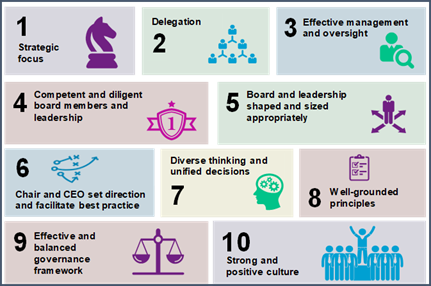Life for pension funds is already challenging and the coronavirus crisis is making it worse. Over the next decade, the pace of change will quicken even further. Just consider the changes in geo-politics, climate, technological leaps and macroeconomic instability, among other factors. This may sound daunting, but there is a silver lining; there will be many opportunities for investment committees (ICs) - and trustee boards too - to strengthen their governance if they keep focused on best practice. As a starting point well run ICs and trustee boards may want to use our top ten governance checklist to prepare for the next period of change ahead.

01
Retaining a strategic focus is vital for all effective board governance and doubly so for ICs where there are always temptations to get lost in the weeds. While ICs don’t have to do too many things if they delegate well, they must make sure that things get done and their greatest strategic focus should be on the high-order principles. The most important are purpose, mission, values and beliefs; and critically they should ensure the strategy is consistent with these principles.
02
Following on from the first point, an IC’s greatest asset is its executive team (the ‘executive’) and delegating well is a way to ensure strategic focus is retained at the board and IC level. For some that is using an internal team as the executive, but if that isn’t feasible, the fiduciary management model is an effective alternative.
03
Oversight is a central IC activity and the discipline with which it pursues this role is important. Key is the ability to go deeply into new investment strategies, as effective engagement and proper IC support only comes with mastery of the detail. While oversight involves following progress - through strategy, process, portfolio and performance - disciplined oversight involves challenging the executive (internal team or fiduciary manager) and being motivational. Note that insufficient delegation results in ICs getting involved the in the more detailed aspects of investment and this can actually create a significant gap in oversight, as Trustees will find it hard to challenge their own colleagues with similar discipline.
04
Jim Collins’ timeless advice, in his book Good to Great, is that organisations need to get the best people ‘on the bus’ and put them in the ‘right seats’, ahead of agreeing the bus’s destination. This is apt for ICs. Good IC candidates will be diligent and competent and chosen in order to make a good team. Team balance is also important here, noting that having investment competency on the IC is critical, but is not required in every member; every person should though bring a unique skill.
05
Five is a good number of members for an IC. This is large enough to ensure a wide range of expertise, but small enough that decisions can be made efficiently. If your IC is much bigger than that be prepared for more time in discussion with no likely improvement in outputs. There is one proviso to this rule of five: you need to secure very high attendance rates to make sure IC meetings are fully quorate. But then IC meetings should be iron-clad in members’ diaries anyway.
06
The chairperson’s role is crucial in terms of setting overall strategic direction and the board’s and IC’s culture. They are responsible for achieving best practice and ensuring high standards. In addition, the people-development and coach role relating to all other members falls to them, as does effective liaison. Good chairs make such a difference, it is hard to stress this enough.
07
Differences of opinion are inevitable, but good boards and ICs should confront these differences and come together with unified conclusions. It is not clear why so many ICs never take votes. Good technology (for example Slido) enables quick checks on mood, deeper examination of issues and a contribution to the trail of why and how decisions were made. Many investment decisions are marginal calls, so full consensus should not be the expectation, instead settlement of views should be the goal.
08
This is a relatively new feature of a well-run board and IC, having come to prominence in the last decade or so. Good investment beliefs are those which are clearly drafted, edgy (in that they imply stretch) and reflect the fund’s comparative advantages. With sustainability rising up the agenda, having a settled set of well-socialised principles and beliefs has become commensurately important.
09
The insourcing/outsourcing decision is critical for creating effective and balanced governance. In ideal circumstances, a large fund (over say 10 billion) can support a team that is highly competent across a wide investment scope. In many circumstances though, scale, competency and scope can only be achieved using the fiduciary management model. This model is certainly attractive from a scale and specialist expertise perspective, but needs highly focused IC members or hired support to provide the required oversight.
10
Many of the current difficulties in pension fund investing stem from a lack of attention paid to culture. Strong culture can be viewed as leveraging good people through behavioural norms. So ICs should examine their own culture, including doing board effectiveness check-ins. They also need to examine the culture of their executive, whether it’s an internal team or a fiduciary manager for alignment, motivation, attraction and retention of talented team members.
Investment committee governance has improved markedly in the past decade, with best practice evolving positively year on year. Current challenges will provide the opportunity for a general step up. Those boards paying attention can seize their chance.